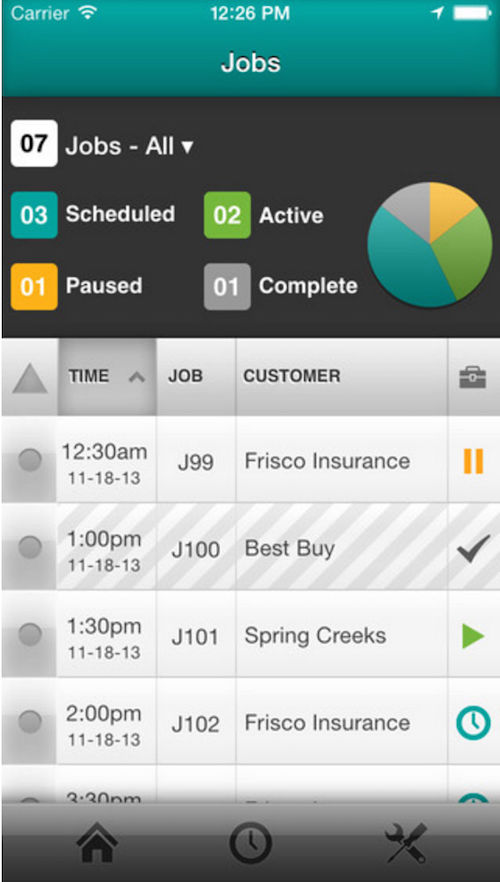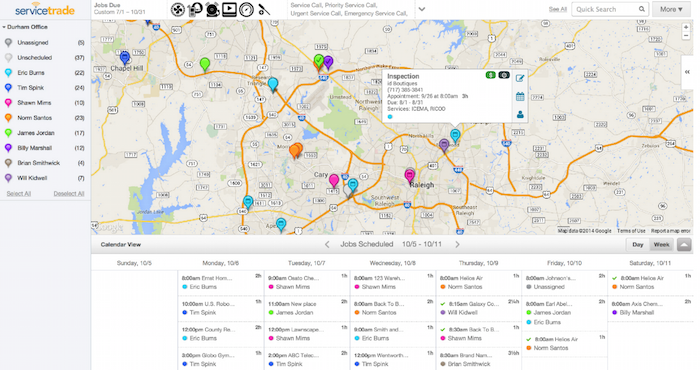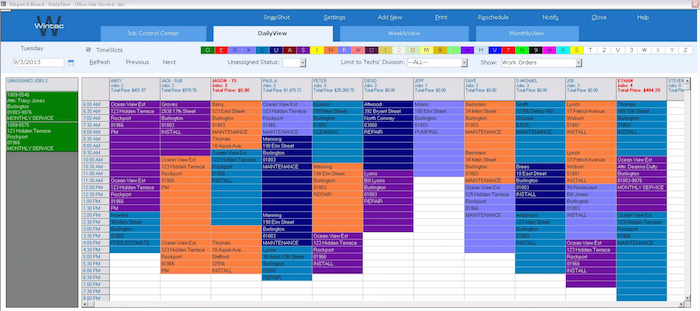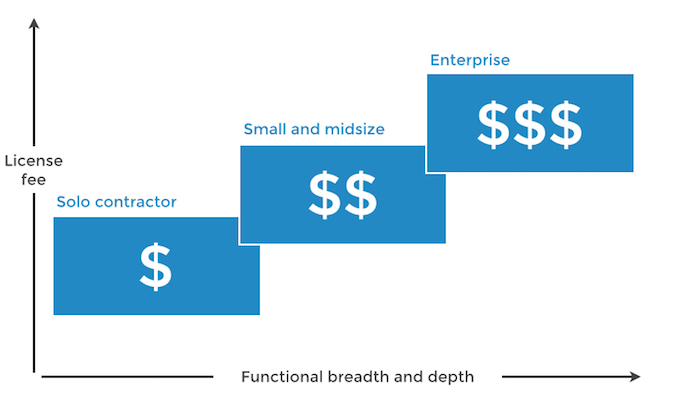Find the best HVAC Software
Compare Products
Showing 1 - 20 of 216 products
Sort by
Reviews: Sorts listings by the number of user reviews we have published, greatest to least.
Sponsored: Sorts listings by software vendors running active bidding campaigns, from the highest to lowest bid. Vendors who have paid for placement have a ‘Visit Website’ button, whereas unpaid vendors have a ‘Learn More’ button.
Avg Rating: Sorts listings by overall star rating based on user reviews, highest to lowest.
A to Z: Sorts listings by product name from A to Z.
Housecall Pro
Housecall Pro
Housecall Pro is a cloud-based field service management app for service professionals to automate workflows and streamline technician dispatch. This solution includes a native mobile app and complementary web portal and serves a w...Read more about Housecall Pro
Jobber
Jobber
Jobber is a cloud-based field service management software solution that allows small and midsize service businesses to manage field staff, provide customer support, and expand business operations either through a mobile app or a d...Read more about Jobber
Service Fusion
Service Fusion
Service Fusion is an all-in-one, cloud-based field service management software. It caters to service contractors and businesses of all sizes across multiple industries. Service Fusion offers field service management, VoIP phone so...Read more about Service Fusion
Zuper
Zuper
Zuper empowers field service businesses to streamline operations and provide exceptional customer experiences. Zuper’s platform is available on the web for PCs, and Zuper’s mobile app fosters effortless scheduling, real-time commu...Read more about Zuper
Talk with us for a free
15-minute consultationSoftware Advice is free because vendors pay us when they receive sales opportunities.
This allows us to provide comprehensive software lists and an advisor service at no cost to you.
This allows us to provide comprehensive software lists and an advisor service at no cost to you.
Meet Eric, a software expert who has helped 1,534 companies select the right product for their needs.
Talk with us for a free
15-minute consultationSoftware Advice is free because vendors pay us when they receive sales opportunities.
This allows us to provide comprehensive software lists and an advisor service at no cost to you.
This allows us to provide comprehensive software lists and an advisor service at no cost to you.
Tell us more about your business and an advisor will reach out with a list of software recommendations customized for your specific needs.
STEP 1 OF 4
How many users do you have?
Sera
Sera
Sera helps small to mid-sized HVAC, plumbing, and electrical businesses make more money by cutting down their day-to-day chaos and helping focus on the highest-value work. Sera helps business owners concentrate only on what real...Read more about Sera
ServiceTitan
ServiceTitan
Transform your business with ServiceTitan's all-in-one software solution for residential and commercial field service businesses. With powerful tools that can increase revenue , supercharge your team, and provide real-time insight...Read more about ServiceTitan
FieldEdge
FieldEdge
The #1 software to run your entire business. FieldEdge by Xplor is a cloud-based field service management solution for home service contractors in fields including HVAC, plumbing, electrical and more. The field service software al...Read more about FieldEdge
Simpro
Simpro
Simpro is a powerful job management software solution created by trade contractors, for trade contractors. If your business struggles with quoting multi-stage projects, managing inventory, communicating with technicians, or any ot...Read more about Simpro
ServiceWorks
ServiceWorks
ServiceWorks is a cloud-based solution that helps businesses manage field employees and service delivery operations. Key features include inventory management, route optimization, customer feedback, alerts/notifications, data stor...Read more about ServiceWorks
FSM Grid
FSM Grid
FSM Grid is an IoT enabled field service management software. Some of its main features include scheduling, routing, work orders and inventory control to automate field service operations and connect in-field teams to a business's...Read more about FSM Grid
ServMan
ServMan
ServMan by WorkWave is an ERP solution designed for larger field service businesses, including those operating in the HVAC, electrical, plumbing and elevator maintenance verticals. ServMan provides both on-premise and cloud-based ...Read more about ServMan
Successware
Successware
All-in-one software to manage dispatching, customer information, service agreements, accounting, sales leads, and more. Our industry-leading mobile field service solution, Successware Mobile, allows techs to fully run their jobs...Read more about Successware
3C Connect
3C Connect
3C Connect is an all-in-one HVAC business management software that allows contractors to streamline operations and increase profitability. The software contains everything contractors need to grow their HVAC business including sc...Read more about 3C Connect
YourRadar
YourRadar
YourRadar is a field management solution where service businesses can schedule quotes, dispatch work orders, and invoice all-in-one platform. It’s simple to implement, with staff training provided to ease the integration process. ...Read more about YourRadar
Davisware
Davisware
Davisware is an all-in-one, comprehensive platform built for the trades by the trades. We have everything you need to streamline your commercial service business and operate at maximum efficiency. Our industry-specific solution...Read more about Davisware
SAMPro Enterprise
SAMPro Enterprise
SAMPro Enterprise by data-basics is a field service and construction management solution that offers modules such as Service Dispatching, Mobile Workforce, CRM, Analytics, Quoting, PO, Inventory and Requisitioning, Preventative Ma...Read more about SAMPro Enterprise
Dataforma
Dataforma
Dataforma Roofing Software was originally designed for roofing contractors, but it is now utilized by other construction trades, including electrical, plumbing and HVAC. It is a web-based business management system that helps cont...Read more about Dataforma
IFS Field Service Management
IFS Field Service Management
IFS Field Service Management (FSM) offers tools that cover the entire service lifecycle. The solution is available on-premise or in the cloud, and it can be configured to meet the needs of organizations in a number of field servic...Read more about IFS Field Service Management
STACK
STACK
STACK Estimating is a cloud-based on-screen takeoff and estimating tool for professional contractors of all business sizes and all trades. STACK users can quickly and easily upload digital plans and complete takeoffs using the sof...Read more about STACK
UpKeep
UpKeep
UpKeep is an Asset Operations Management solution that helps businesses scale by giving every Maintenance and Reliability team the tools and information they need to run Operations efficiently and effectively. From your desktop to...Read more about UpKeep
Buyers Guide
Last Updated: March 16, 2023The heating, ventilation and air conditioning (HVAC) service sector is an $82 billion industry. As it continues to grow, there’s no shortage of software products on the market to support it.
Whether you have a one-man shop, small business or large enterprise, HVAC field service management software is critical. These systems organize technicians’ daily tasks, customer data and more and help keep appointments on schedule.
However, since there are many product options, it might be difficult to know which one is best for your business. To help, we put together this guide.
Here’s what we’ll cover:
What Is HVAC Service Software?
Common Functionality of HVAC Service Software
Potential Benefits of Using HVAC Service Software
How HVAC Service Software Is Priced
Integration With Other Applications
What Is HVAC Service Software?
HVAC service software is a type of field service management technology built specifically to handle the workflows and requirements of HVAC contractors. Buyers looking for HVAC dispatch software or HVAC scheduling software will typically find an integrated HVAC service software system beneficial. These systems can track almost any type of data that field technicians might need to help them work more efficiently, such as:
Work orders
Service contracts
Parts inventory
Invoices
GPS-tracked locations of field technicians
Since HVAC service software is intended for use in the field, most applications are accessible on mobile phones, laptops and tablets. That way, technicians can access customer details and work history, keep detailed notes, accept payments and capture photos on-site—all without having to call dispatch for information or update records when in the office.

Job schedule and status on iOS app for FieldAware
Common Functionality of HVAC Service Software
HVAC products typically support appointment scheduling, invoice creation and customer data storage. Beyond that, some systems also track HVAC equipment information, manage the business’ parts and supply inventory and facilitate customer communication.
Here’s a detailed description of this functionality:
Scheduling and routing | Lets field managers generate service schedules and routes based on the availability of contractors and other resources. |
Customer management | Basic customer management tools let companies store and view customer account details, payment and service history. |
Invoicing and payments | Allows technicians to create work invoices and automate customer payments upon completion of service while on site. |
Equipment tracking | Helps companies keep track of HVAC equipment details, such as make, model, serial number, warranty data, manufacturer and more. |
Inventory management | Lets users maintain inventory supply by tracking what items are used and sold and restocking when levels are low. |
Customer portal | Service customers can view available appointment windows, submit service requests, pay invoices and check expected arrival times. |

Service scheduling dashboard for ServiceTrade
Potential Benefits of Using HVAC Service Software
Service contractors who figure out how to effectively incorporate this software into their workflows can realize many benefits, including:
Fewer scheduling errors. Software Advice found nearly 67 percent of field service customers (not HVAC-specific) would not re-hire a company if a technician was up to 60 minutes late. Clearly, it’s important to prioritize punctuality. HVAC service software’s scheduling capabilities can give dispatchers a complete view of contractor schedules, location and availability to set appointment times contractors can keep.

Scheduling and dispatch board daily view for WinTac
Reduced double data-entry. The majority of HVAC service applications are built for use in the field. Therefore, technicians can create invoices, update records, take notes, track their time and more while on the job. This is much more convenient (and accurate) than having to create hand-written records that are entered into a system back in the office.
Increased overall efficiency. Service management products for HVAC companies automate many tasks, including: work orders generation, time tracking, scheduling, invoicing and customer management. When done manually, such tasks require many hours each day, so automating them can eliminate a lot of administrative work.
How HVAC Service Software Is Priced
The cost of field service software for HVAC contractors generally increases as the depth of functionality increases.
HVAC Service Software Pricing

Products on the lower end of the cost scale typically include only the most essential functionality, such as scheduling and basic invoicing and customer management. On the higher end, products have a more robust feature set—customer portals, inventory management and GPS fleet tracking capabilities, for example.
HVAC software’s price is also dependent on the number of people who will use the product. Some vendors charge a one-time or recurring fee based on the number of users. For example, a single user is charged a license fee; then, as the number of users who will need to access the system goes up, the per-user license cost goes down.
Other vendors charge a fixed one-time or recurring fee, which stays the same whether one or 50 users access the application.
The difference in per-user versus fixed-rate pricing models is especially important for businesses with many technicians.
Integration With Other Applications
For some businesses, especially large enterprises, integrating HVAC service software with other business applications is important.
Common integrations include:
Accounting software. HVAC business owners who integrate their field service software with an accounting solution can save themselves from having to manually transfer invoice and billing data from one application to another.
Customer relationship management (CRM) software. Companies with sales and customer support teams often require advanced interaction tracking and multi-channel marketing automation to effectively nurture prospective and existing customers. Integration with a CRM application can lead to more insights to help those teams upsell and meet customer expectations.







